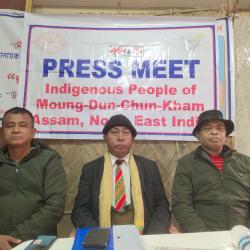The first Session of the Anti Trafficking-in-Persons Conclave 3 took off at Hotel Brahmaputra Ashok Conference Hall Thursday evening. The Conclave is the third in the series which seeks to explore and replicate best models to address Trafficking-in-Persons in Northeast India and its bordering countries.
The Asian Centre for Human Rights identified Guwahati as the main transit point for trafficking of women from North Eastern states to other parts of the country, particularly Siliguri, Kolkata and New Delhi. According to the US State Department millions of women and children are trafficked in India annually which is a source, destination and transit country for men women and children subjected to forced labor and sex trafficking. Forced labor of millions of its citizens constitutes India’s largest trafficking problem; men, women, and children in debt bondage are forced to work in industries such as brick kilns, rice mills, agriculture, and embroidery factories.
The Session I of the Conclave: Igniting Innovation in Market Access, Corporate and Social Enterprise Approach to address unsafe migration, preventing human trafficking kicked off with a welcome speech by Rachel Sunden, Deputy Director, American Center, Kolkata. The panelists were: Biswajit Chakraborty, Head North East Council, FICCI, Arnab Chakraborty, National Director, UNCTAD, Hasina Kharbhih, Managing Director, Impulse Social Enterprises, Gaurav Gogoi, Founding Secretary, Farm2Food Foundation and Nandinee Kalita, Director and Head, Assam State, Confederation of Indian Industry. Former Special Secretary to the Government of India, Krishan Varma moderated the session.
Acclaimed multi-lingual actor, human rights and labor issues campaigner Victor Banerjee was the star attraction who appeared briefly during the session and assured to lend his support and celebrity persona to help address the issue of Trafficking-in-Persons. He said, “I tend to always believe that my heart belongs to Assam and the Northeast but my soul rests in Uttarakhand.”
The session discussed issues related to the responsibility of the promotion of sustainable livelihood initiatives in the region, the necessity of responsible business initiatives, Corporate Social Responsibilities (CSR) towards livelihood and connectivity issues of the region.
Biswajit Chakraborty, Head North East Council, FICCI, presenting his views on the causes of migration and trafficking said that only education and employment with added skill sets will be able to get vulnerable people on a higher platform of employment and keep them from being trafficked.
In his speech on entrepreneurial developments, Arnab Chakraborty, National Director, United Nations Conference on Trade and Development (UNCTAD) said that entrepreneurship is a way out of abject poverty. He highlighted UNCTAD’S maiden efforts in India with Empretec which is an integrated capacity-building programme that promotes the creation of sustainable support structures that help promising entrepreneurs build innovative and internationally competitive small and medium sized enterprises (SMEs), thereby contributing to the development of a dynamic private sector.
Among the areas that UNCTAD is interested to work closely are women entrepreneurship, technology entrepreneurship and interpreneurship which is promoting an entrepreneurial culture in governance, in large organizations, public sector organizations and transnational. UNCTAD have examples of success which is not just poverty alleviation but robust business linkage platforms that help regional collaborations and cooperations.
Empretec started initially as a technical assistance request of the United Nations by Brazil in Argentina in the early eighties and it is a fairly well structured programme today. “Among other Indian states Assam is one we had the privilege of presenting our credentials before the honorable Chief Minister of the state who has requested Empretec for the state,” Chakraborty informed.
Presenting her views on the role of the corporate sector, Nandinee Kalita, Director and Head, Assam State, Confederation of Indian Industry said, “Corporates will have to play a very important role within the Corporate Social Responsibility cap and so also the civil society organizations. Once a bridge is built between these two sectors it will be possible to go ahead to identify the vulnerable section for proper rehabilitation. In the Northeast except for telephone companies there are no Private Sector Units (PSUs) working on Corporate Social Responsibility. Its mostly the PSUs who have to work on this.”
She cited two approaches which can be taken in this direction; one: the involvement of NGOs in identifying the vulnerable sections and helping them to create livelihood, entrepreneurship and acquire developed skills including education and infrastructure especially the underprivileged and the school drop outs who are most vulnerable to trafficking. And secondly, the participation of the corporates in taking up rescue and rehabilitation programmes.
Talking about the importance of entrepreneurship and enterprise building she said that since survivors of trafficking cannot become entrepreneurs all by themselves, corporates and the CII must literally hand hold them, identify small projects for them and once their livelihood is assured help them to access the market. She informed that CII has already started an initiative on this line called the Bharatiya Yuva Shakti Trust. It identifies underprivileged entrepreneurs who has no access to banks whom the corporates help take a loan. She stressed on the corporate involvement and commitment in tackling trafficking and empowerment through CSR initiatives that can be diverted to combating trafficking which is one of the third most rampant crime that afflicts our society after crime and drug dealing.
Gaurav Gogoi, Founding Secretary, Farm2Food Foundation which aims to transform farming by providing training on organic practices, community development support, youth development, market and advocacy support to farmers in Northeast India citing the present economy of India said, “Agriculture is driving the revival of the Indian economy and after agriculture is infrastructure. Its not manufacturering, its not IT, its not banking, its agriculture. And that’s where a small solution lies because we have not done justice to this sector, and when I say agriculture I just do not mean production, I just don’t mean paddy, I mean agriculture and allied activities. I also would like to encompass within it, the industry side of it in terms of food processing, storage, warehouse, all that value added products in terms of bio-pesticides and medicines.”
It is with the idea and motivation of agriculture and creating entrepreneurship within agriculture that he started the Farm2Food Foundation which over the next three years will be working with three thousand children in Class Eight telling them and teaching them how to be agri-entrepreneurs; how to grow something from the land and how to make profit from it. He also drew the attention of the participants on the importance of combating Climate Disasters which the region is prone to.
Drawing from experience, Hasina Kharbhih, Managing Director, Impulse Social Enterprises said, “We have worked so much on the issue of prevention, on the issue of policing, the issue of rehabilitation, the issue of providing prosecution to traffckers, but, having spent this journey I realize that at the end of the day it boils down to poverty and an unstable economy that makes women whom I have been working with all these years migrate from the Northeast.”
Honing in traditional skills that can give market accessibility to the survivors of trafficking, offering them a long term sustainable market so that the can be back to the area where they come from and empowering them to make their decisions can essentially ensure that women and children do not get trafficked, she concluded.
The panel ended with an informative interactive session thrown open to the participants that included the who’s who of the government, the business industry, the stakeholders and civil society organizations from Indian states and visiting country representatives.
- 11070 reads










Add new comment